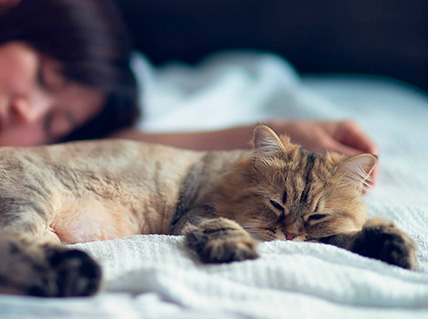

It's not just humans: cats can get dementia, too, also known as cognitive dysfunction. Unfortunately, cats that are lucky to live a long life may experience some level of cat dementia. Geriatric cats that appear to be "confused" could be experiencing something more specific than "just old age."
Older Cats: A New Field of Study
Feline dementia is a tricky disease and is sometimes under-diagnosed, under-treated and misunderstood by veterinarians and cat people pet parents, alike. Now that cats are living longer than ever before, diagnoses are becoming more and more common.
Cats with dementia show signs similar to humans with senile dementia or Alzheimer's disease. In light of advancements in human dementia treatment, veterinary professionals are starting to wonder whether there's something they can do about cat dementia.
The Signs of Cognitive Dysfunction in Cats
Like any other organ, the brain deteriorates with age. The aging feline brain often starts to show signs of wear and tear between the ages of 10 to 15, after which these signs may seem to accelerate as the disease progresses and the signs become more noticeable.
The typical signs of cat dementia include:
Veterinary medicine is still searching for the answers to such questions as Feline dementia is considered especially baffling. Is feline dementia attributable to a specific neurological disorder? Is it identical to the process observed in people? Can it be treated?
Diseases That Influence Feline Dementia
There are a variety of geriatric diseases that can mimic, overlap with or increase the signs of feline dementia. Since they tend to occur during the same life stage, cats are often misdiagnosed so their dementia may remain untreated. The following diseases are important to list here because they may deepen the dementia or hasten its onset and accelerate its course.
Hyperthyroidism
An overactive thyroid gland produces too much thyroid hormone and is a common disorder diagnosed in older cats. An excess of thyroid hormone can interfere with organ function, including the brain, explains the Cornell Feline Health Center. It makes cats hungry, for one, and they may beg for food incessantly. It can also lead to heat-seeking behavior, increased activity and vocalization and/or a dazed mental state that mimics dementia. Your veterinarian may prescribe a blood test to check out your kitty's thyroid function.
Hypertension
Cats can get high blood pressure, too. According to the Cornell Feline Health Center, kidney and thyroid disease are the most common causes. High blood pressure can also lead to changes in the brain that might cause signs of dementia or worsen existing dementia. Your veterinarian can take a blood pressure reading to help rule this out.
Deafness and Sensory Decline
Deaf cats don't know their own meow volume. This can factor into cognitive dysfunction, much like it does with older people who tend to become more disoriented when auditory cues in the environment become less perceptible to them. In much the same way, blindness will also contribute to an older cat's confusion, typically deepening it even more dramatically than deafness.
Arthritis or other causes of Chronic Pain
It's really hard to identify pain in cats since most cats don't carry on like humans do when they're uncomfortable. Most choose to hide their discomfort as a survival mechanism. However, older cats who suffer from pain and dementia may show more signs than others. They may resist being petted, seem more "off," aggressive, anxious or vocal.
Brain Tumors or Other Neurological Conditions
Brain tumors are a possibility for older cats who show signs of dementia. Tumors can lead to seizures and collapse, but all kinds of abnormal behavior such as incoordination or reacting to 'invisible' objects are suspect, too. Many other neurological diseases can also lead to signs similar to those seen in cats with dementia.
How to Help Your Older Cat
Any senior cat with signs of dementia should ideally be tested for all the diseases that can mimic or accompany it. If your cat is suffering from feline dementia or confusion, here's what you can do to keep her safe and comfortable:
It's critical for any cat who shows any of signs of dementia to see a veterinarian as soon as possible. It's important for pet parents to know that their cats are not "just getting old" — they may be experiencing a true disease that requires a little extra care, and because it's not as easy to determine if your cat is confused as it is in humans, understanding your cat's normal behavior is a critical first step in diagnosing cat dementia.
Contributor bio
Dr. Patty Khuly
Dr. Patty Khuly is an honors graduate of both Wellesley College and the University of Pennsylvania School of Veterinary Medicine. She received her MBA at The Wharton School of Business as part of the prestigious VMD/MBA dual-degree program. She's now the proud owner of Sunset Animal Clinic in Miami, Florida. But that's not all. Dr. K is a nerdy reader, avid knitter, hot yoga fanatic, music geek, struggling runner, and indefatigable foodie. She lives in South Miami with three dogs, countless cats, two rescued goats and a hilarious flock of hens.
You can follow her writing at DrPattyKhuly.com and at SunsetVets.com.
Share this awesome site with other pet parents with senior citizens